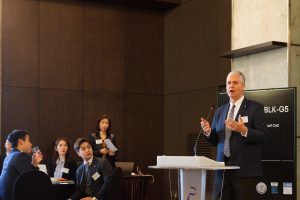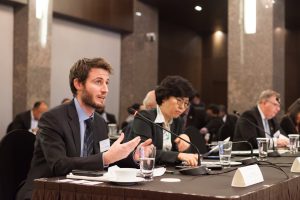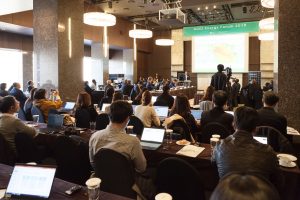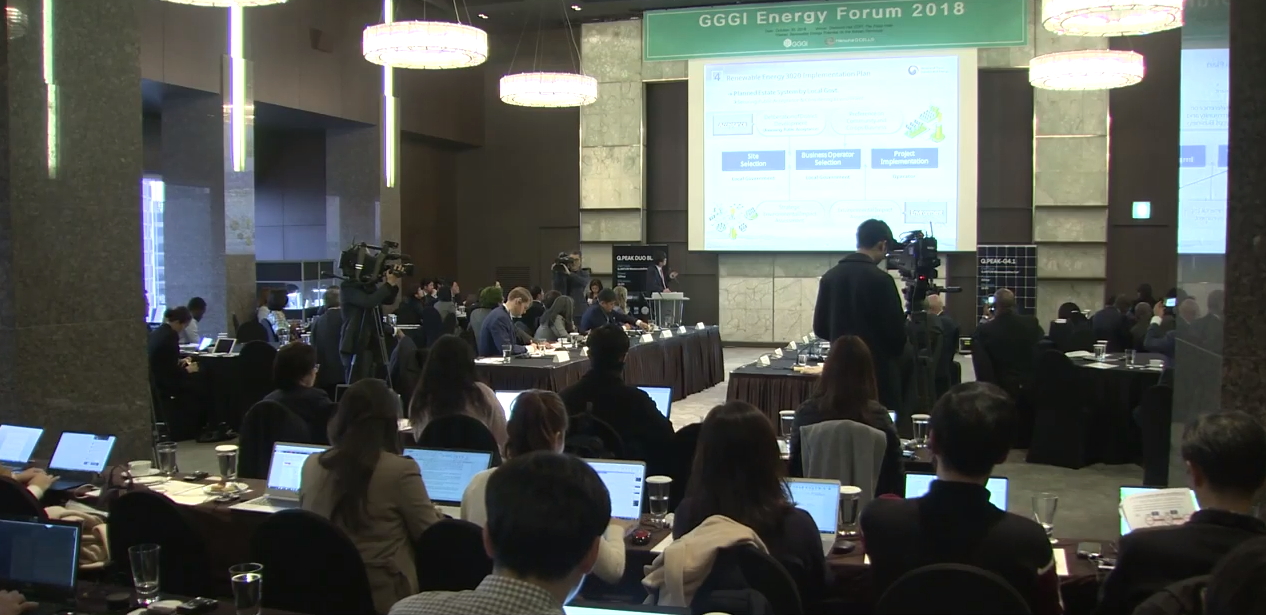 October 30, Seoul, Republic of Korea – The Global Green Growth Institute (GGGI) and Hanwha Q CELLS jointly organized the GGGI Energy Forum 2018 on October 30 in Seoul, Republic of Korea. Under the theme of “Renewable Energy Potential on the Korean Peninsula,” the GGGI Energy Forum served as a platform for sharing energy transformation experience from different governments, including GGGI’s Member countries and discussing the renewable energy potential in Korea. The aim of the Forum was to bring together GGGI’s Members, leading energy experts, and policy makers from both the private and public sectors to discuss the importance of shifting towards a renewable energy-driven economy and sustainable future.
October 30, Seoul, Republic of Korea – The Global Green Growth Institute (GGGI) and Hanwha Q CELLS jointly organized the GGGI Energy Forum 2018 on October 30 in Seoul, Republic of Korea. Under the theme of “Renewable Energy Potential on the Korean Peninsula,” the GGGI Energy Forum served as a platform for sharing energy transformation experience from different governments, including GGGI’s Member countries and discussing the renewable energy potential in Korea. The aim of the Forum was to bring together GGGI’s Members, leading energy experts, and policy makers from both the private and public sectors to discuss the importance of shifting towards a renewable energy-driven economy and sustainable future.
14 speakers and discussants from GGGI’s Member and partner countries, including Denmark, Norway, Mongolia, and the UK and energy experts in Korea took part in this event to share their countries’ journey to a renewable energy future. The Forum started with keynote speeches, followed by an interactive discussion among the discussants who shared how their countries are making the transition to sustainable economies.

In his opening remarks, Dr. Frank Rijsberman said “GGGI is on track to help mobilize more than $1 billion in green and climate finance to support developing countries achieve their green growth plans in 2017-18.” GGGI is supporting its Member and partner countries to achieve their Nationally Determined Contributions (NDCs) for the Paris Agreement through support for NDC Action Plans, Low Emission Development Strategies, design of Monitoring, Reporting and Verification systems (MRVs) as well as the design, structuring and financing of investment projects on renewable energy, green cities, sustainable landscapes, water and sanitation.
He noted that we should bust the myth that Green Growth is an expensive option. Solar energy, even with battery storage, is already commercially attractive where diesel energy is the alternative such as in small islands and off the grid. The World Bank stopped funding coal projects because renewable energy is now cheaper than coal generated electricity. Rwanda’s new Bugesera Airport became cheaper when the design was “greened”. Green growth is the only viable option for a sustainable future – and it is already commercially attractive in many cases.
Mr. Hans-Josef Fell, President of the Energy Watch Group said, “Not only countries, but also cities like San Francisco and Copenhagen, and global companies like Google and Coca Cola have set 100% renewable energy targets. The energy transition on the Korean Peninsula is essential.” He added that “In order to realize this, we need tax incentives for renewable energy technologies and institutional arrangements to stimulate private investment.”
Ms. Izumi Kaizuka, Director of RTS Corporation, a Japanese PV-exclusive consulting company, introduced Japan’s energy case, which is actively implementing energy transition in the wake of the Fukushima nuclear disaster and she emphasized the importance of ‘improving public consciousness’ to foster renewable energy.
“Energy issues should focus on creating a sustainable growth environment for future generations rather than securing the economy at the present time,” said Mr. Kyung-ho Lee, Director of the New and Renewable Energy Policy Division, Ministry of Trade, Industry and Energy, Republic of Korea. He said that “the Ministry of Trade, Industry and Energy will push ahead with implementing its policies to ensure competitiveness in the renewable energy sector as a leading export industry in Korea.”
Click here to view a presentation by Mr. Hans-Josef Fell, President of the Energy Watch Group.
Click here to view a presentation by Ms. Izumi Kaizuka, Director of RTS Corporation.
Click here to view a presentation by Mr. Kyung-ho Lee, Director of the New and Renewable Energy Policy Division, Ministry of Trade, Industry and Energy, Republic of Korea.
 During the discussion session, participants from GGGI’s Member countries, including Denmark, Mongolia, Norway, the UK and energy experts in Korea shared their countries’ energy transformation experience. Denmark explained the benefits of using the district heating system, Mongolia shared how it is promoting the development of wind and solar power, Norway demonstrated how electric cars have been booming, with the aim for all new cars to be all-electric by 2025, and the UK elaborated on its Clean Growth Strategy and highlighted key policies to transition to a low-carbon, sustainable pathway.
During the discussion session, participants from GGGI’s Member countries, including Denmark, Mongolia, Norway, the UK and energy experts in Korea shared their countries’ energy transformation experience. Denmark explained the benefits of using the district heating system, Mongolia shared how it is promoting the development of wind and solar power, Norway demonstrated how electric cars have been booming, with the aim for all new cars to be all-electric by 2025, and the UK elaborated on its Clean Growth Strategy and highlighted key policies to transition to a low-carbon, sustainable pathway.
In Korea, the supply of renewable energy and energy storage systems more than doubled in the first quarter of 2018 compared to the same period last year due to the easing of regulations. The Moon Jae-in government has set a new goal “Renewable Energy 3020” targeting for the share of renewable in power generation to increase from the current 7 to 20 percent by 2030 while expanding incentives for renewable energy investment and the easing of regulations. Private-sector projects utilizing renewable energy are also under way throughout Korea, further accelerating the transition.

As an intergovernmental organization securing renewable energy opportunities, GGGI has been supporting countries to achieve sustainable development and climate action through new, innovative green industries and jobs. In 2017, GGGI helped mobilize USD 524 million in green and climate finance to support developing countries achieve their green growth plans. The Institute continues to support governments to develop green growth plans and policies.
Click here to watch the highlight video of the GGGI Energy Forum 2018
